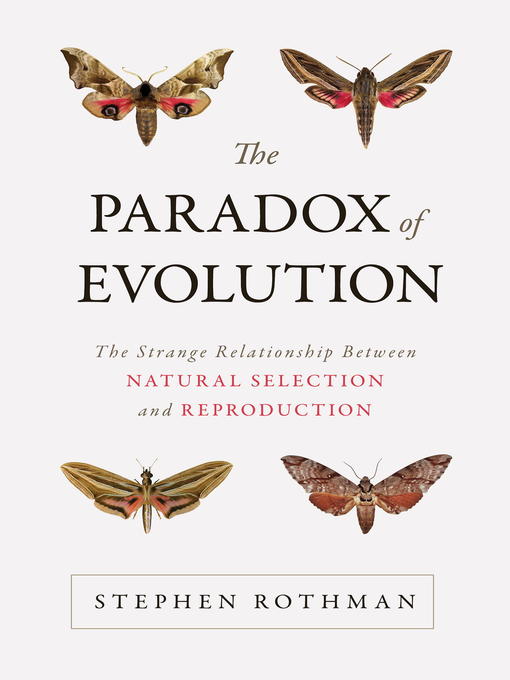The Paradox of Evolution
The Strange Relationship between Natural Selection and Reproduction
In meticulously detailed but accessible terms he lays out the crux of the paradox and offers an intriguing solution within a naturalistic framework. In an ostensibly purposeless universe, somehow purposeful life has evolved. For all living things there are two overarching purposes: survival and the creation of new life. Natural selection is about the survival of existing life, but has no interest in life's future, about whether it persists or perishes. By contrast, reproduction is only about the future of life, and has no interest in existing life except as a means to that end.
Where do these purposes come from? As Rothman demonstrates, at every level life is wired to react to danger. Counterintuitively, without the danger to its existence, life would not have come into being. As for reproduction, nature's destructive forces drive the creation of new life.
Written with great clarity and informed by deep learning, this elegant, thoughtful work tackles some of the most challenging questions raised by the theory of evolution, while calling to mind Darwin's famous words from the conclusion of On the Origin of Species: "There is a grandeur in this view of life."
-
Creators
-
Publisher
-
Release date
December 1, 2015 -
Formats
-
Kindle Book
-
OverDrive Read
- ISBN: 9781633880733
- File size: 2204 KB
-
EPUB ebook
- ISBN: 9781633880733
- File size: 2204 KB
-
-
Languages
- English
-
Reviews
-
Publisher's Weekly
January 11, 2016
In dense and repetitive text, Rothman (Life Beyond Molecules and Genes), a retired physiologist from the University of California, San Francisco, attempts to point out a major flaw in evolutionary theory and offer an alternative perspective. Unfortunately, the flaw he refers to is of his own making and is not recognized by other biologists, while his "fix" provides no meaningful mechanism for action and flies in the face of much of modern population genetics. Rothman simplistically and idiosyncratically defines evolution, claiming that "natural selection is about survival," that it is distinct from change in a population's genetic composition, and that it "progresses toward some optimum incarnation of a particular trait." However, most biologists recognize that survival is important only because dead individuals can't reproduce, that changes in allele frequencies is exactly how evolution is measured, and that evolution has no end goal. Given his definition, Rothman separates reproduction from natural selection, stating that its purpose is "to help ensure the continuance of our reproducing group, our species, the population of organisms which we are but an impersonal part." But Rothman offers no mechanism for such action and ignores the point that his perspective is at odds with virtually every aspect of evolutionary theory that has been proposed for the past 40 years. -
Library Journal
November 15, 2015
Charles Darwin's theory of natural selection has been a fundamental paradigm of evolutionary biology for nearly 75 years (it was not immediately accepted upon publication of On the Origin of Species in 1859). Rothman (emeritus, biology, Univ. of Calif., San Francisco; Life Beyond Molecules and Genes, Lessons from the Living Cell) believes that attempts to refute established scientific theories is "science of the highest order," and in that spirit the author has constructed a logically elaborate argument to prove that the reproductive process (and all physical features associated with it) could not have evolved by means of natural selection since reproduction confers no survival advantage to the living parents. It may appear odd that a biologist who has spent a career as a "committed Darwinian," as he describes it, would focus on a flaw in Darwin's theory; however, this is Rothman's third book in a series devoted to his concerns about how biologists study living organisms. VERDICT As readers would need a strong background in Darwinian theory and reproductive biology to evaluate Rothman's thesis, this book is recommended more for specialists than for general science readers.--CLK
Copyright 2015 Library Journal, LLC Used with permission.
-
Loading
Why is availability limited?
×Availability can change throughout the month based on the library's budget. You can still place a hold on the title, and your hold will be automatically filled as soon as the title is available again.
The Kindle Book format for this title is not supported on:
×Read-along ebook
×The OverDrive Read format of this ebook has professional narration that plays while you read in your browser. Learn more here.


